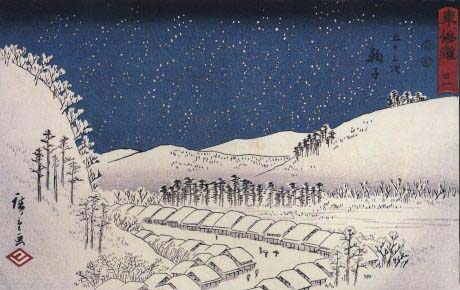Winter and Depression: a Symbolic Connection

While there are many joys in winter, it’s easy for all of us to feel an intuitive linkage between winter and depression.

Hiroshige, Snow Falling on a Town, Mariko
There’s an importance to that symbolism that makes it well worth considering, from a /a-midlife-transition perspective.
I live in Oakville, in Ontario, Canada. We’ve had a remarkably mild winter this year, with very little snow in the month of January. Yet, if the statistics are correct, we have had only twelve hours of sunlight during the month! This has had a substantial impact on the mood of many.
It’s the absence of light, the cold, and the presence of much water in cloud and storm that gave winter its character in ancient mythology.
Seasonal Affective Disorder
Although not “symbolic” per se, winter is the season of seasonal affective disorder, a mood condition in which depressive symptoms are induced by the low levels of bright sunlight during the winter season in northern climes. Seasonal affective disorder, (or SAD as it’s known) is quite widespread. The Ontario CMHA estimates that between 2 and 3% of the population actually are debilitated to some degree by seasonal affective disorder, while up to another 15% suffer from a milder version, known as the “winter blues”. If you experience depressive symptoms that seem to be associated with the winter season, you should consult a health or mental health professional.

Apollo’s Sun Chariot in Snow, Versailles
Apollo is Absent in the Three Months of Winter
According to Plutarch, the god Apollo was absent from his oracle at Delphi during the winter months; his place was taken by Dionysos. Apollo, god of the sun, of music, and of bright, clear reason is, as it were, eclipsed in winter. So it may seem in situational depression, when often individuals can find it hard to find their bearings, think clearly and to move forward on goals or projects.

Poseidon in Winter
Poseidon’s Season
In the ancient world winter was thought of as the season of Poseidon, the god of the Upper and Lower Waters, that is the waters of the oceans, and also those in the atmosphere. In winter, the storm clouds are heavy with water, and the god of the depths can seem to also be in control of the sky.
Symbolically the watery depths often symbolize the depths of the unconscious. As Jung tells us, in depression, our energy can be dammed up or brought down into the unconscious, trapped because of a life or coping problem that the individual cannot easily resolve. As Prof. Andrew Samuels stresses that, somewhat counter-intuitively, Jung encouraged people to enter as deeply as possible into the feelings associated with the depression. Why? So that those feelings might be clarified — turned into a clearer idea or image, with which the person may relate, and work towards concrete resolution, change and movement in his or her life.
Beyond Winter and Depression
It’s easy for most of us to readily understand the symbolic joining together of winter and depression. The season of sun may be overcome, and light and clarity disappear from consciousness for a time. But in the depths, in the waters of the psyche, the unconscious is often active, as the individual seeks a resolution of fundamental issues in his or her life.
It’s the goal of /a-midlife-transition to work with the winter of depression, its bleakness and barrenness, and to find in its midst the seeds of clear feeling and ultimately desire, and yearning for life. The goal is the return of Apollo, with his sunlight and clarity — but, through working with depression, to have greater understanding of our own depths, and a greater capacity to move to the heart of our own true longings, and our own real life.
Brian Collinson, Registered Psychotherapist & Jungian Psychoanalyst
[cta]
